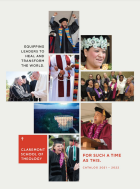At its core, theology engages key issues of meaning and purpose. It helps individuals and communities wrestle with the critical challenges of ethics and values. And this degree track equips students to continue the long history of theology and religion meeting culture at its most important questions. Students have used this track to pursue goals as wide ranging as interfaith care and counseling, preaching for liberation, religion and the arts, spiritual formation, and complex religious bonds. You can forge your own path, because this is a program with flexibility. You will do core studies in the Hebrew bible and New Testament, study world Christianity, and develop your own systematic theology. And you’ll take classes in Christian ethics and spiritual practices. From there the direction is yours, because religions are evolving. But the questions often repeat.
MTS in Theological Disciplines Curriculum:
MTS Core Requirements – 18 credits
Interreligious Studies – 6 credits
TIR3001 Interreligious Dialogue and Leadership (3 credits)
Elective in Interreligious Studies or Second Religious Tradition (3 credits)
Electives* – 12 credits
THEOLOGICAL DISCIPLINES – 18 credits
THB3007 Hebrew Bible in Context (3 credits)
TNT3003 New Testament in Context (3 credits)
THC3007 History of World Christianity (3 credits)
TTH3036 Systematic Theology (3 credits)
TEC3001 Intro to Christian Ethics (3 credits)
TSF3008 Formation: Spiritual Practices (3 credits)
Area of Focus – 9 credits
Three courses in a theological discipline chosen in consultation with advisor.
Summative Course – 3 credits
TRE3040 Vocational Praxis (3 credits)
TOTAL – 48 credits
Activism & Social Justice
African & African-American Religious Studies
Arts, Religion, & Culture
Comparative Studies in Religion
Constructive & Political Theology
Contemplative Leadership
Contemplative Studies
Decolonial Studies
Dharma Traditions
Ecology & Spirituality
Ecological Civilization
Engaged Compassion
Ethics & Social Change
Hebrew Bible & Jewish Studies
History of Christianity
Interfaith Care & Counseling
Interreligious Education
Interreligious Studies
Islam in Interreligious Dialogue
Jain Studies
New Testament & Christian Origins
Pacific & Asian American Studies in Religion
Philosophy of Religion
Practical Theology
Preaching for Liberation
Process Studies
Religion & the Arts
Religion, Ethics, & Society
Religious Education
Sexuality, Gender, & Religion
Spiritual Formation
Spirituality & Sustainability
Social Change
Theology
United Methodist Studies
MTS students seeking Deacon’s Orders in the United Methodist Church must complete the following courses (15 credits) as electives or as part of their area of focus:
TWP3015 Introduction to Christian Worship and the Arts (3 credits)
TDS3001 United Methodist History (2 credits)
TDS3002 United Methodist Polity (2 credits)
TDS3000 United Methodist Doctrine (2 credits)
TDS3039 Christian Evangelism (3 credits)
TDS3045 Christian Mission (3 credits)
Some United Methodist conferences require one unit of Clinical
Pastoral Education for ordination, which would count for up to 6 academic credits. Students are strongly recommended to check with their conference regarding this ordination requirement.
NOTE: Since these United Methodist classes are only required for ordination and not for graduation, CST considers them “Free Electives” for master’s-level students and therefore can be passed with a grade of D-. However, that may not be sufficient according to the requirements of the Board of Ordained Ministry in a particular Annual Conference. United Methodist students should ask their Annual Conference in advance what grade is considered acceptable for meeting these course requirements.
Want to learn more?
Reach out to the Admissions Counselor for this program, Karen Gonzalez, by emailing kgonzalez@cst.edu or by using the below link to submit an inquiry form.



